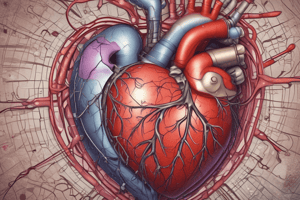Podcast
Questions and Answers
In very lean patients, what is the reason for feeling their heart pounding or beating?
In very lean patients, what is the reason for feeling their heart pounding or beating?
- They have a heart condition
- They are anxious or panicked
- Their heart is closer to the chest wall (correct)
- They have a throat infection
What is the percentage of cardiac causes of palpitations?
What is the percentage of cardiac causes of palpitations?
- 31%
- 25%
- 43% (correct)
- 50%
What is the term for the increased strength of contraction of the heartbeat following a pause in the cardiac cycle?
What is the term for the increased strength of contraction of the heartbeat following a pause in the cardiac cycle?
- Supraventricular tachycardia
- Post-extrasystolic potentiation (correct)
- Premature atrial contraction
- Ventricular tachycardia
What is the purpose of a 24-48 hour Holter monitoring?
What is the purpose of a 24-48 hour Holter monitoring?
What is a common cause of irregular, sustained palpitations?
What is a common cause of irregular, sustained palpitations?
What is the effect of salbutamol on the heartbeat?
What is the effect of salbutamol on the heartbeat?
What is a common cause of palpitations in patients who consume excessive alcohol?
What is a common cause of palpitations in patients who consume excessive alcohol?
What is the condition characterized by an increase in mast cells, which can cause palpitations?
What is the condition characterized by an increase in mast cells, which can cause palpitations?
Why do some patients experience palpitations when they lean forward or to the left side?
Why do some patients experience palpitations when they lean forward or to the left side?
What is the percentage of unknown causes of palpitations?
What is the percentage of unknown causes of palpitations?
Study Notes
Edema
- Excessive accumulation of interstitial fluid, which can be localized or generalized (anasarca)
- Grading of Edema: • Grade 1: ankle • Grade 2: legs • Grade 3: reaches the abdomen or generalized (anasarca)
- In patients with heart failure, daily weighing helps detect water retention
- Brawny edema: chronic edema of the legs causing fibrosis of the subcutaneous tissue and skin, leading to hyperpigmentation or discoloration of lower extremities
- Ascites and hydrothorax: accumulation of fluid in the peritoneal and pleural cavity
Palpitation
- Fast beating or pounding of the heart
- Causes: • Cardiac (43%) • Psychiatric (31%) • Miscellaneous (10%) • Unknown (16%)
- Intermittent palpitations: commonly caused by premature atral or ventricular contractions
- Regular, sustained palpitations: caused by regular supraventricular and ventricular tachycardias
- Irregular, sustained palpitations: caused by atrial fibrillation
- Psychiatric causes: panic attacks or disorders, anxiety states, and somatization
- Miscellaneous causes: thyrotoxicosis, drugs and ethanol, spontaneous skeletal muscle contractions of the chest wall, pheochromocytoma, and systemic mastocytosis
Studying That Suits You
Use AI to generate personalized quizzes and flashcards to suit your learning preferences.
Description
This quiz covers alterations in the circulatory system, including edema, palpitation, and heart murmurs. It discusses the characteristics and grading of edema, and is suitable for medical students and healthcare professionals.




